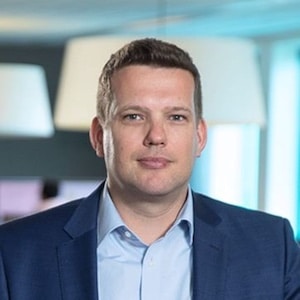Preventive healthcare is ‘absolute necessity’
How to ensure an effective health policy, focused on prevention? How can we shift towards preventing disease? And why is that necessary? Robert Metzke (Philips), Machteld Kors (UNStudio) and Kim Brouwers (Diabetes Fonds) share their thoughts.
Prevention is always better than cure. Especially when healthcare is under pressure from rising costs, an aging population and staff shortages. Amsterdam Economic Board is therefore working with partners in a Prevention initiative to strengthen prevention measures in the Amsterdam region.
Organising health policy focused on prevention is a very complex task, believes Kim Brouwers, Impact Manager of the Diabetes Fonds. “Who can determine the most effective preventive measures, and when can one speak of success?”
“Recently, we conducted a thorough review of the Diabetes Fonds activities,” Brouwers continued. “What are our priorities, which activities contribute most to these? And what can we do to increase that impact? My new position as Impact Manager was created to focus more on such results.”
Sustainable change
The National Sugar Challenge is a very successful campaign of the Diabetes Fonds. Every year, more than 75,000 Dutch people take up this challenge and eat products with as little added sugar as possible for one week.
“Qualitative research shows that 85 percent of participants continue to consciously check labels even months later,” says Brouwers. “A great result, which could be even better if we could add more pressure on food producers, through a broad coalition of united civil society partners.”
Networking par excellence
That need for collaboration is one of the reasons the Diabetes Fonds is participating in the Amsterdam Economic Board’s Prevention initiative. “To fight diabetes, you have to push various buttons, and the result is in the best combination,” says Brouwers.
“We are eager to learn from other parties’ approaches. At the same time, we are trying to increase our impact through collaboration,” she continued. “Amsterdam Economic Board is pre-eminently a party that makes this possible, with its broad networking function and strategic-societal agenda setting. We therefore expect a lot from this new prevention initiative and the insights of the other participants.”
Multidisciplinary matter
Machteld Kors, director of strategic development at UNStudio, is also looking forward to the Prevention Workshop. Kors is an engaged member of our Network Council. The global architecture firm UNStudio signed for, among other projects, the new Qatari metro network, the Brainport Smart District in Helmond and the Booking campus on the Oosterdokseiland in Amsterdam.
“Developing these types of large projects is increasingly a multidisciplinary affair,” Kors says. “I myself am an architectural historian, and I see how our designers are working more and more intensively with, for example, sociologists or experts on sustainability and shaping experiences.”
Crucial orientation phase
“To achieve the best end result, it is important to involve all these different experts and disciplines in a project as early as possible,” Kors continued. “This is because you are already making a lot of choices that may seem unimportant at the time, but which later have a major impact on, for example, liveability or carbon footprint.”
Investors are also becoming increasingly aware of this, according to Kors. They therefore set aside more time for the crucial orientation phase. This is also an important reason for Kors and UNStudio to participate in the Prevention initiative and the Regional Prevention Coalition also initiated by the Amsterdam Economic Board.
Different perspectives
“Health and inclusiveness are important themes in almost all of our projects,” Kors says. “We are therefore looking at opportunities as early as possible to tailor our designs accordingly. Thanks to this prevention initiative, we are bringing together new insights from many different perspectives. This allows us to tailor our projects even better to the multifaceted needs of users.”
Like Brouwers, Kors endorses the need to focus on measurable results. “In developing the Booking campus, we made numerous assumptions about the impact of design and layout on users,” she illustrates. “For example, the use of light or the ability to move around a lot. Then, of course, you want to know if that has an effect.”
Proven effectiveness
To verify those assumptions, once the campus was completed, UNStudio and Booking initiated what is known as a post occupancy evaluation: a study of the design’s effect on users. Kors: “With the help of real estate professor Nils Kok of Maastricht University, we put briefing and design choices alongside qualitative research on the well-being and job satisfaction of Booking employees working in the campus.”
“The insights we pick up from this, we apply to other projects,” Kors confirms. “Whenever possible in combination with insights from other disciplines. I think this can also be the great added value of the prevention initiative: by combining all these different insights, formulating proven effective strategies becomes much easier.”
Systemic change
For Robert Metzke, driving data-driven insights is among the core duties of his position as Philips’ Global Head of Sustainability. He is also a member of our Board. “As a manufacturer of sustainable healthcare technology, we have been completely carbon neutral since 2020,” he says. “We also now convinced nearly half of our 15,000 suppliers to commit to the same science-based goals.”
According to Metzke, research shows that the healthcare sector emits more CO2 worldwide than all air and shipping combined. “At the same time, half of humanity has no access to health care at all. That puts immense pressure on healthcare,” he argues. “The commitment to preventive healthcare is an absolute necessity for this reason as well. And you simply cannot solve these kinds of wicked problems in isolation.”
Perfect starting point
With Kim Brouwers and Machteld Kors, Metzke therefore endorses the great importance of the Prevention initiative. “You can’t expect the government to solve this problem,” he believes. “Real progress requires systemic changes throughout society. More and more companies and other organisations want to take their role in this, but often do not know where to start. Amsterdam Economic Board’s platform is a perfect starting point.”
As a Board member, Metzke is closely involved in the Data Commons Collective and Health Data Space Amsterdam initiatives. “With that, we are working hard to activate relevant data,” he says. “This is produced on a large scale, but is still far too little converted into valuable insights. This is partly because the ethical, legal and technical frameworks are lacking for unlocking data in the public sphere. We are developing the ground rules for that.”
Personal feedback
If the (privacy) interests of participants are guaranteed, this data could bring about big changes, Metzke believes. “Personalized feedback is a very powerful tool to encourage healthier behaviors,” he illustrates. “Simple example: a sensor-equipped toothbrush that tells the user that they ‘structurally forget to brush properly at the bottom left.’ Even on a larger scale, this is a powerful driver of positive behavior change.”
By extension, Metzke also sees great value in the power of communities. “For example, our Pregnancy Plus app puts pregnant women in touch so they can advise and support each other,” he says. “That makes a real contribution to preventing premature births and underweight babies, for example. And therefore also preventing stress, disease and deprivation in young mothers.”
Here, too, Metzke sees significant added value to Amsterdam Economic Board’s initiatives. “We are talking about a very diverse metropolis of 2.5 million people. With the insights we generate, we increase the socioeconomic impact of prevention policies, and the inclusive prosperity of the region. At the same time, we can provide people with opportunities to advance themselves. I find that a very motivating thought.”
Text: Arnoud Groot
15 February 2024
Read more about
Contact us
Want to keep up to date?
Get the best regional news and events (in Dutch) via the Board Update newsletter
Share this news
Want to keep informed?
Follow us daily on LinkedIn and sign up for the Board Update newsletter.
Read more
- What is the Amsterdam Metropolitan Area’s position on critical raw materials? ...
- Preparations for the National Zorginnovatieprijs 2026 by Zorginnovatie.nl are underway, and registration ...


